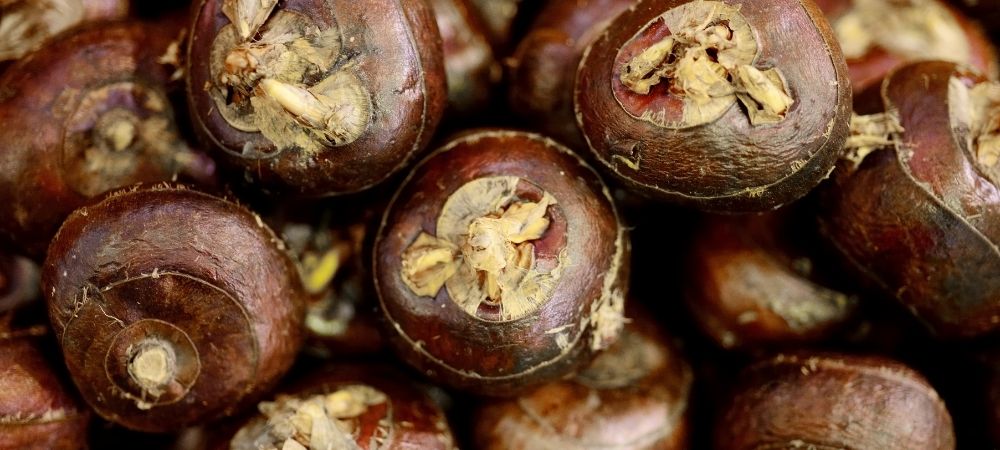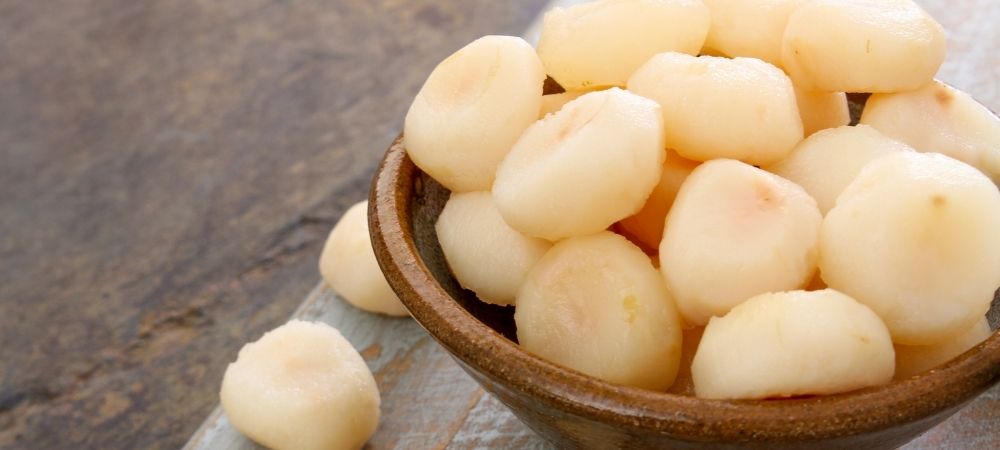
Water chestnut is an aquatic vegetable, meaning it grows in water and is edible.
If you ever tried it, you’d know it tastes something like coconut and an apple, sweet and nutty.
Maybe you’d like your furry friend to join in on this incredible taste. But can dogs eat water chestnuts?
The short answer — yes. This article explains which ones are best and which you should avoid.
Can Dogs Eat Water Chestnuts?
Yes, dogs can safely eat raw water chestnuts. In fact, if you feed water chestnuts to your canine, they will also get health benefits and valuable nutrition.
However, not all water chestnuts are the same. You want to avoid storebought ones because of additional ingredients, namely salt. Also, too many water chestnuts at once can give stomach problems to your furry friend.
Are Water Chestnuts Healthy for Dogs?
Yes, water chestnuts can be really healthy for our four-legged friends. They are pretty nutritious, and dogs can absorb the vitamins and minerals contained in them.
Water chestnuts are very high in potassium, magnesium, zinc, iron, and vitamin B6 (pyridoxine). These vitamins and minerals are crucial for many bodily functions, including heart health, strong nerves, and the immune system.
Furthermore, when dogs eat water chestnuts, they also ingest healthy omega fatty acids. A proper Omega3-to-Omega6 ratio is vital for skin and coat health in dogs.
The biggest advantage of water chestnuts is that they contain proteins, antioxidants, fiber, and fatty acids while remaining relatively low in fat. This means that your furry friend gets all the good stuff without packing on extra pounds.
Are Water Chestnuts Bad for Dogs?
Some types of water chestnuts can be harmful — primarily storebought ones, because of the extra ingredients.
Raw water chestnuts are safe for your dog. Just remember that they are high in fiber. This means that your dog shouldn’t eat too many of them. Otherwise, extra fiber might irritate the dog’s digestive system and lead to an upset stomach, diarrhea, or even vomiting.
Storebought and canned ones are a different story. These often contain too much sodium, leading to sodium ion poisoning. This condition can be fatal for many dogs.

Different Types of Water Chestnuts
Should dogs eat water chestnuts, regardless of their type? Nope.
Raw water chestnuts are the best, along with some other types. Yet, there are several varieties you should consider — and even avoid feeding your dog.
Let’s take a more in-depth look and see which ones are the safest.
Can Dogs Eat Raw Water Chestnuts?
Yes, dogs can eat raw water chestnuts in moderation. You should not feed them too many because they are high in carbs and fiber. Too many raw water chestnuts will contribute to weight gain, obesity, and diabetes in the long run. Short-term effects include diarrhea, vomiting, and an upset stomach.
Before you let dogs eat water chestnuts, make sure to peel them properly and remove all the hard skin.
Can Dogs Eat Frozen Water Chestnuts?
Yes, frozen water chestnuts are safe for dogs to eat. In fact, they will probably love the crunchy texture.
But that doesn’t mean you should just serve them straight out of the freezer. Make sure they are adequately thawed before feeding them to your canine.
Can Dogs Eat Cooked Water Chestnuts?
Yes, dogs can safely eat cooked water chestnuts. But, there are a few pointers to consider.
Feeding cooked water chestnuts to dogs can be healthy, but you have to prepare them properly.
The best option is boiled and mashed water chestnuts. This way, they are tasty, crunchy, and easily digestible to our fur babies.
Don’t use any extra salt or spices with cooked water chestnuts. Doing so might lead to salt poisoning and other health issues.
Can Dogs Eat Roasted Water Chestnuts?
Yes, roasted water chestnuts are one of the better options to feed your dog.
Dogs will love the hard texture and crunchiness while simultaneously getting all the health benefits.
Just make sure that the roasted chestnuts do not contain extra spices or added salt.
Can Dogs Eat Canned Water Chestnuts?
No, dogs should not eat canned water chestnuts. The chestnuts themselves are safe for dogs, but other ingredients make them potentially harmful.
Canned and storebought water chestnuts generally contain too much salt. High salt intake leads to stomach problems, diarrhea, and even sodium ion poisoning. Salt toxicity is often fatal for dogs.
Can Dogs Eat Water Chestnut Skin?
No, water chestnut skin or shell is not safe for dogs. It’s too hard for canines.
Water chestnut skin poses a choking hazard to our furry friends. Furthermore, the skin can easily splinter and hurt a dog’s intestines or cause intestinal blockage. This often requires surgical intervention.
Before you feed your dog water chestnuts, make sure to peel the skin and remove it altogether.
Can Puppies Eat Water Chestnuts?
Yes, puppies can safely eat water chestnuts in small amounts and on rare occasions.
Fresh water chestnuts are beneficial for puppies as well as the adult dogs. The same rules apply — avoid storebought and canned chestnuts, and make sure there is no extra salt or harmful spices.
Can Dogs Eat Horse Chestnuts?
No, dogs should not eat horse chestnuts. Horse chestnut is entirely different from a regular one or a water chestnut.
Horse chestnuts contain the compound aesculin, which is toxic and potentially fatal for dogs.
Aesculin toxicity includes symptoms like drooling, vomiting, loss of appetite, and lethargy.
If your dog ate horse chestnuts, call the vet immediately.

How Many Water Chestnuts Can You Feed Your Dog?
So, you’re happy to let your dog eat water chestnuts — because of all the healthy benefits and great taste.
Remember that sometimes too much of a good thing can still be bad. The fiber content in chestnuts can be challenging on your dog’s digestive tract — and we don’t want that!
That is why feeding your dog water chestnuts should be done in moderation and rarely. Once or twice a week, one to two water chestnuts are more than enough!
Your dog’s health will still benefit from them, and the canine gets to enjoy the sweet and nutty flavor. But you won’t have to worry about the potential side effects or call the vet!
Alternatives to Water Chestnuts
Maybe you think that sweet chestnuts are best left for human consumption. That doesn’t mean your dog can’t gobble up some other food from the pantry.
Here are additional healthy snacks for your dog:
- Apples
- Blueberries
- Broccoli
- Carrots
- Kale
- Parsley
- Pumpkin
All of these are just as crunchy, healthy, and tasty. Dogs love these alternatives, and they also provide loads of healthy nutrients.
The Bottom Line
Water chestnuts can be a healthy snack for our furry friends if fed in small amounts and on rare occasions.
Fresh water chestnuts are the best option, provided you peel the skin first. Make sure to avoid canned water chestnuts because of too much sodium.
But, the healthy food options for our furry companions don’t stop there. If you like sharing food with your four-legged friends, there are many other human foods dogs can safely eat and enjoy.

